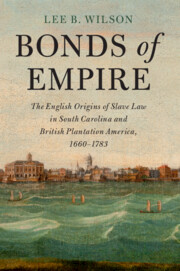‘Employing an original perspective and approach, Wilson provocatively uses her law degree to read new understandings into how slavery transformed African-descended people into forms of property - sometimes chattel, sometimes real estate, sometimes salvage. Importantly, Wilson’s legal history centers the humanity of the enslaved by considering lived experiences, including how captives challenged the variegated methods of their subjection.’
Kevin Dawson - University of California, Merced
‘This is a book that we’ve needed for a long time, for it demonstrates how readily England's legal language fit chattel slavery in early America. Colonial lawmakers did not need to invent new terms, new procedures to exert power over slaves: colonists could rely upon legal words and practices already found in common law, admiralty, and equity. Slave law was part and parcel of the English empire’s legal regime.’
Sally E. Hadden - Western Michigan University
‘Wilson shows how English law facilitated the expansion and perpetuation of racial slavery in America. The book convincingly argues that all law in the plantation colonies was slave law, insulating owners from moral qualms and facilitating economic growth by transforming enslaved people into property. Bonds of Empire is a timely intervention in the lively new literature on Anglo-American imperial history.’
Peter S. Onuf - Thomas Jefferson Professor of History, Emeritus, University of Virginia
'… Bonds of Empire represents a significant contribution to slavery studies and the history of the British Atlantic. Wilson convincingly demonstrates the centrality of English common law in governing colonial slavery and makes an effective argument that scholars of the legal history of slavery must study legal practice, as well as legislation, to fully understand the institution.'
Frances Bell
Source: H-Net: Humanities and Social Science Reviews Online
‘This erudite volume adds to the scholarly understanding of American slave-holders’ deep engagements with the most modern features of the Atlantic world, as well as of the multiple mechanisms they wielded in pursuit of mastery over their human property. In it, Lee B. Wilson offers deeply documented insights, preeminently on legal history and the history of slavery … Wilson clearly adds to our understanding of the weapons in American slaveholders’ arsenal, and of how ruthlessly they wielded them.’
Matthew Mason
Source: The Journal of Southern History
'Wilson’s book is beautifully written and modest in its ambitions. But it is a hugely important book.'
Trevor G. Burnard
Source: H-Net



